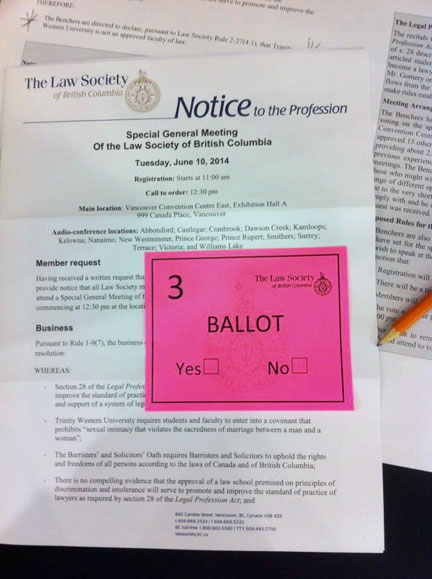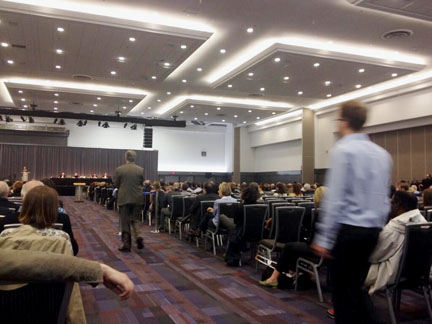After 18 speakers, billable hours that probably reached $250,000 from participating lawyers, and two hours of debate yesterday, the resolution to reverse the earlier Law Society of British Columbia’s decision to approve Trinity Western University’s law school pass has passed at a special meeting vote with a wide margin.

The vote was 3,210 in favor and 968 opposed. B.C. has about 11,000 lawyers.
However, under the Legal Profession Act, the resolution is not binding on the LSBC benchers who approved TWU’s program April 11. LSBC president Jan Lindsay said the decision whether to allow TWU students into the LSBC admission program is a bencher’s decision.
“The benchers will give today’s members meeting serious and thoughtful consideration,” she promised.
“This is a complex issue that engages many points of view,” said Lindsay. “There is currently litigation challenging the B.C. provincial government’s decision to approve a law school at TWU and litigation in Ontario and Nova Scotia challenging the decision by law societies there not to approve the proposed law school at TWU. Ultimately, I fully expect that the issues raised will be decided by the Supreme Court of Canada.”
The predicted SCC court case would clarify what was central to the two hour special general meeting that drew in lawyers from across the province: where the equality rights of lesbian, gay, bisexual, and transgendered individuals and those questioning their sexuality stand in relation to freedom of religion?
The debate was polarized as 1,241 lawyers and 33 articling students turned up to form a quorum at 16 different locations, including 642 lawyers and 22 articling students at the Vancouver Convention Centre hub of the debate.
Key to answering the question of which rights will trump was the 2001 Supreme Court of Canada case
Trinity Western University v. College of Teachers. Those opposing the motion to deny accredidation to the law school stated the ruling was clear in its intent and had not been challenged or changed in 13 years. TWU is a private religious organization that could hold onto its religious beliefs that barred same sex relationships.
The pro-motion faction maintained the ruling was old and out-of-date with what was happening in society and if brought into court would not uphold the view of today’s society.
At the same time, the role of the LSBC was being examined with the anti-motion faction stating its role was to examine the content of the law school to see if graduates would meet the B.C. standard and ensure the school functioned within the law.
The pro-motion group — many of whom in Vancouver wore rainbow pins — argued there was the duty of the LSBC to protect the public interest in a broader sense and move forward with the moral aspects of the law rather than case law.
The convention centre had three microphones that illustrated the polarized debate with those supporting the motion on one s

ide and those against on the other. LSBC president Lindsay took one speaker from each side in shifts and then two speakers from points throughout the province. But, it was clear after two hours and many speakers there were still hours of speakers left.
Leading those supporting the denial motion was well-known gay rights leader barbara findlay, who received a standing ovation for her speech arguing for the rights of inclusion into all aspects of society, and that “perceived leadership is the role of the benchers” in preserving those rights. She said she was proud to be standing before the “entire legal community that is here to consider the rights of lesbian lawyers” and the meeting was an unprecedented move to sustain the rights of the LGBTQ community.
However, she warned, “This is not a case of us against them,” but individuals within the LGBTQ community having the right to be free from discriminatory actions.
TWU president Robert Kuhn said: “The conflict over sexuality and faith is extremely personal.” It is also potentially emotional and often complex.
But, he also said the university held the view same sex relationships were outside the Christian faith and he apologized if they offend or hurt individuals. He asked those individuals voting on the resolution to consider the matter as carefully as the benchers of the LSBC, the provincial government, and the Federation of Law Societies of Canada had in approving TWU’s law school.
Kuhn argued that it is the role of lawyers to uphold the rights of all individuals.
Michael Mulligan, who spearheaded the action to call the special meeting, said the TWU covenant that restricted same-sex relationships was discriminatory.
“We are just coming out of a long dark age,” he said, speaking of B.C. discriminatory past, adding that B.C. lawyers should not fall back into it. “There is no difference between religious freedom and the right to be free from discrimination.”
He said the SCC’s previous TWU ruling was not sustaining and pointed to 1967 SCC ruling that found a male guilty of gross indecency for having sex with other men. “Let’s refuse to slip backward in the continuous fight for human rights,” he said. “If called up to defend it in court, we will do so.”
B.C. Civil Liberties Association president Lindsay Lyster, who declared herself part of the LGBTQ community, said she supported the Trinity Western University application and also did not want to see debate reduced to “us versus them.” She said TWU was expressing its religious views as they had been sustained by law and had the right to freely express those views.
While she acknowledged the human rights of the LGBTQ community, she said “it cannot be bought at rights of others.” She also acknowledged a majority vote on issues did not always guarantee the rights of all individuals.
“Those rights that are fundamentally free are not subject to a majority vote,” she said, adding the challenge of achieving human rights lies in the dignity of acknowledging the rights of all individuals.
The LSBC notes the special vote is not binding on the benchers to reverse their earlier support for TWU.
If the resolution has not been substantially implemented in 12 months following the special meeting and the executive director receives a petition signed by at least five percent of members in good standing of the society requesting a referendum on the resolution, a referendum of all members must be conducted. If at least one-third of the members vote in the referendum and two-thirds are in favour, then the resolution is binding, provided that implementation would not constitute a breach of the benchers’ statutory duties.
Update 12:53EDT: Photos from event added.

 The vote was 3,210 in favor and 968 opposed. B.C. has about 11,000 lawyers.
The vote was 3,210 in favor and 968 opposed. B.C. has about 11,000 lawyers. ide and those against on the other. LSBC president Lindsay took one speaker from each side in shifts and then two speakers from points throughout the province. But, it was clear after two hours and many speakers there were still hours of speakers left.
ide and those against on the other. LSBC president Lindsay took one speaker from each side in shifts and then two speakers from points throughout the province. But, it was clear after two hours and many speakers there were still hours of speakers left.